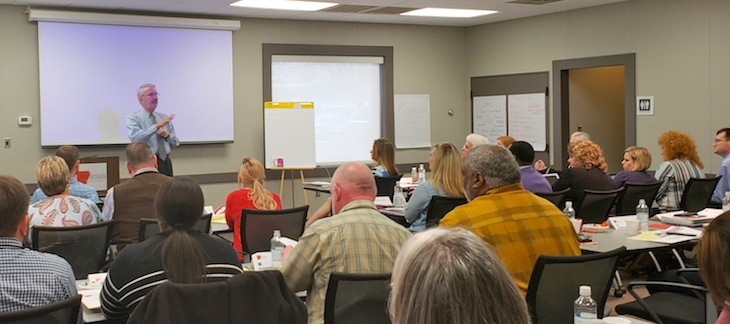Arkansas’ workforce skills gap a ‘brutal hard fact’ that needs to be addressed
by April 3, 2018 4:03 pm 3,427 views

State Chamber CEO Randy Zook speaks during the annual Mid-South Economic Developer’s class in Little Rock about workforce concerns.
State Chamber of Commerce CEO Randy Zook and other state and industry experts warned job recruiters Tuesday (April 3) the state’s most critical workforce issue is finding enough skilled talent in a tight job market to fill thousands of good-paying jobs.
Speaking at the Chamber’s annual Mid-South Basic Economic Development Course in Little Rock, Zook challenged the class of 42 economic developers and chamber of commerce officials from across the state to find ways to get industry, school and community leaders at the same table to design a strategy to address what he called the state’s most pressing workforce concern.
“Every day, all I hear from our members and Arkansas businesses from across the state is that they need workers,” Zook said. “Is there anybody here that has plenty of folks that are skilled and ready to go to work that are champing at the bit and will show up three days in a row? This is the universal problem. A lot of chamber people have been beating this drum that we are short (workers) and it is getting worse every day. That is a brutal hard fact to get people to listen to.”
The longtime chamber chief added: “If your community is unable to fill the talent pipeline, then your community ultimately is going to become economic roadkill.”
Zook later told the room the industry executives he talks to every week are having difficulty finding drug-free, high school graduates willing to be trained and show up to work on time. He said many industries and manufacturers are posting help-wanted signs for jobs with salaries starting at $35,000 a year.
“That’s the kind of opportunity that’s out there at place after place after place … It’s tough and you will earn every nickel of it, but there are opportunities for jobs with well-above average pay by the thousands in Arkansas,” Zook said. “We got all this economic potential that we can’t realize.”
Before Zook offered his comments, Fort Smith human resource executive Jason Green told the economic developers there are numerous barriers in many Arkansas communities that hurt job recruitment efforts or keep local employers from finding the right talent for unfilled positions. Green, vice president of HR at global motor manufacturer ABB, said his company is grappling with finding workers to replace key “over 50’ employees nearing retirement age. He said Fort Smith has a very talented labor pool, but most of those workers are already employed or looking to leave the job market, adding that 50% of ABB’s workers are over the age of 50.
“What we don’t have is pipeline of talent to fill the jobs that we already have (open),” Green said. “And our (over 50) workers are going to be fishing (retiring) soon.”
Green said ABB and other Arkansas hiring executives also have to deal with evolving skill sets, low unemployment, lack of interest, a limited pipeline of talent, and “preparing students for college versus a career.”
“We have a lot of open positions in the state. We just don’t have the talent to fill them,” Green said of the Swiss-based industrial manufacturer, which acquired Baldor Electric Co. in 2011. “If we don’t deal with this problem now, then it will be a much bigger problem in the next 10 years.”
In addition to Zook and Green, top policymakers from the Arkansas Department of Career Education also gave a 45-minute presentation citing the many challenges top employers across the state are having in finding skilled workers. ADCE Deputy Director Cody Waits said common complaints state policymakers receive from industry executives is that many Arkansans lack the basic skills necessary for entering the workplace. He said the purpose of the state’s workforce development efforts should be to “bridge the gap” between employee demand and the community supply.
Stephanie Isaacs, ADCE’s associate director, said local communities need to come up with “out-of-the-box” workforce solutions that address many of the problems facing industry. She said many high schools and community colleges across the state don’t adapt to the fast-moving changes and innovations necessary to fill industry jobs in local communities.
“Often the business need may not align with that community’s education goals. Businesses don’t care about that – they care about skills. These (educators) are selling it, but businesses are not buying it.”
After the two-hour classroom presentation, Sen. Jane English, R-North Little Rock, said the Chamber curriculum on workforce development was an eye-opening course that should be shared with educators, legislators, economic developers, city and economic industry leaders from across the state.
“I have been preaching this for the last decade,” said English, the chief legislative architect of Gov. Asa Hutchinson’s workforce initiative enacted into law during the 2015 regular session.
Last week, Gov. Hutchinson and the Arkansas Economic Development Commission unveiled a new initiative designed to aid local communities to recruit and successfully compete for new job prospects and economic development dollars. Under the new initiative, once local economic developers complete the program, then that city or municipality will receive the “Competitive Community” designation to market to outside industry and job prospects. AEDC officials said the community checklist will help the state match each community’s strengths and weaknesses with job prospects that are looking to locate in Arkansas.
During the event, Hutchinson also expressed concerns about the state’s workforce readiness weaknesses, citing Arkansas’ multiple failed attempts as the only southern state to land an automobile plant due to the failure to check-off key issues related to the state’s brimming labor pool.
